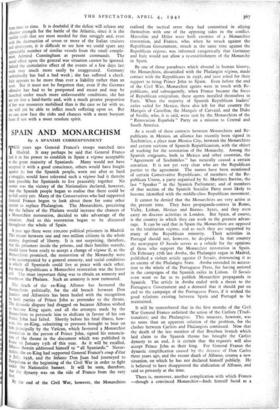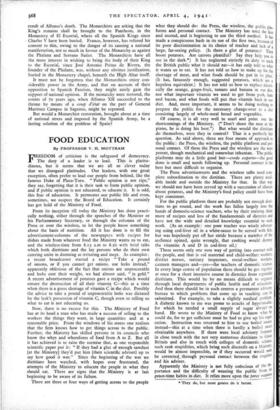SPAIN AND MONARCHISM
By A SPANISH CORRESPONDENT Tw°years ago General Franco's troops marched into Madrid. It may perhaps be said that General Franco had it in his power to establish in Spain a regime acceptable to the great majority of Spaniards. Many would not have accepted it with a good conscience, others would have fought against it; but the Spanish people, worn out after so hard a struggle, would have tolerated such a regime had it thereby been possible for Spaniards to live peaceably together. No sooner was the victory of the Nationalists declared, however, than the Spanish people began to realise that there could be no full unity yet Many of the Conservatives who had supported General Franco began to look about them for some other system to replace Phalangism. The Monarchists, perceiving that the failure of the Phalanx would increase the chances of a Monarchist restoration, decided to take advantage of the situation. And so this restoration began to be discussed throughout the whole of Spain.
A year ago there were 100,000 political prisoners in Madrid. This meant between one and two million citizens in the whole country deprived of liberty. It is not surprising, therefore, that the prisoners inside the prisons, and their families outside, should have been ready to accept a change of regime if, as the Monarchists promised, the restoration of the Monarchy were to be accompanied by a general amnesty, and social conditions in which all Spaniards could live at peace with each other. For many Republicans a Monarchist restoration was the lesser evil. The most important thing was to obtain, an amnesty and Overthrow the Phalanx. Such an amnesty is now rumoured.
The death of the ex-King Alfonso has favoured the Monarchists politically, for the old breach between Don Juanists and Alfonsists has been healed with the recognition by both parties of Prince John as pretender to the throne. The dynastic dispute had dragged on because Alfonso wished to become King again, and all the attempts made by the Monarchists to persuade him to abdicate in favour of his son Prince John had failed. Shortly before his fatal illness, how- ever, the ex-King, submitting to pressure brought to bear on him principally by the Vatican, which favoured a Monarchist restoration in the person of Prince John, signed his renuncia- tion of the throne in the document which was published in Rome on January 15th of • this year. As it will be recalled, Alfonso therein addressed himself to " all Spaniards." Never- theless, the ex-Icing had supported General Franco's coup d'etat in July, 1936, and the Infante Don Juan had journeyed to Pampeluna at the beginning of the Civil War in order to fight under the Nationalist banner. It will be seen, therefore, that the dynasty was on the side of Franco from the very ant.
By the end of the Civil War, however, the Monarchists realised the tactical error they had committed in allying themselves with one of the opposing sides in the conflict. Mussolini and Hitler were both enemies of a Monarchist restoration, and Franco, who, when he struck against the Republican Government, struck at the same time against the Republican regime, was informed categorically that Germany and Italy would not allow a re-establishment of the Monarchy in Spain.
By one of those paradoxes which abound in human history, the Monarchists, dissatisfied with the Phalangist regime, made contact with the Republicans in 1938, and later asked for their support to bring Prince John to Spain. Even before the end of the Civil War, Monarchist agents were in touch with Re- publicans, and subsequently, when France became the focus of Republican emigration, these agents installed themselves in Paris. When the majority of Spanish Republican leaders' exiles sailed for Mexico, there also left for that country the Marquis of Castellon, the Marquis of Carvajal, and the Duke of Seville, who, it is said, were sent by the Monarchists of the " Renovacion Espanola " Party on a mission to Central and South America.
As a result of these contacts between Monarchists and Re- publicans in Mexico, an alliance has recently been signed in Xochimilco, a place near Mexico City, between the Monarchists and certain sections of Spanish Republicanism, with the object of working for the restoration of the Monarchy. Among the Spanish emigrants, both in Mexico and other countries, the " Agreement of Xochimilco " has naturally caused a certain sensation. It is- not yet very clear who are the Republican parties to the agreement. The names have been mentioned of certain Conservative Republicans; of members of the Re- publican Union, a party organised by Sr. Martinez Barrios, the last " Speaker " in the Spanish Parliament; and of members of that section of the Spanish Socialist Party most likely to become identified with the middle-class Republican movement.
It cannot be denied that the Monarchists are very active at the, present time. They have propaganda-centres in Rome, Vichy, Lisbon, Mexico and Buenos Ayres, and they even carry on discreet activities in London. But Spain, of course, is the country in which they can work to the greatest advan- tage. It can be said that in Spain the Monarchists are opposed to the totalitarian regime, and as such they are supported by many of the Republican minority. Their activities in Portugal should not, however, be despised. In that country the newspaper 0 Seculo serves as a vehicle for the opinions Qf those who support the Monarchist restoration in Spain. On February 27th last Arriba, the Phalangist organ in Madrid, published a violent article against 0 Seculo, denouncing it as an enemy of the Phalangist State. Arriba extended its accusa- tion to the whole of the Portuguese Press, for having assisted in the campaigns of the Spanish exiles in Lisbon. 0 Seculo even went so far as to publish Monarchist propaganda in Spanish. The articIe in Arriba ended with a threat to the Portuguese Government and a demand that it should put an end to the campaign of the Portuguese Press, if it wished the good relations existing between Spain and Portugal to be maintained.
It will be remembered that in the first months of the Civil War General Franco ordained the union of the Carlists (Tradi- tionalists) and the Phalangists. This measure, however, was no more than an apparent solution of the problem, for the clashes between Carlists and Phalangists continued. Now that the death of the last member of that Bourbon branch which laid claim to the Spanish throne has brought the Carlist dynasty to an end, it is certain that the requetes will also accept Prince John as their king. For General Franco the dynastic simplification caused by the decease of Don Carlos three years ago, and the recent death of Alfonso, creates a new situation, on which he has not declared himself publicly. He is believed to have disapproved the abdication of Alfonso, and said so privately at the time.
There is, moreover, another complication with which Franco —though a convinced Monarchist—finds himself faced as a result of Alfonso's death. The Monarchists are asking that the King's remains shall be brought to the Pantheon, in the Monastery of El Escorial, where all the Spanish Kings since Charles V have been buried. Franco, however, has refused his consent to this, owing to the danger of its causing a national manifestation, not so much in favour of the Monarchy as against the Phalanx and Serrano Sutler. The Monarchists have all the more interest in wishing to bring the body of their King to the Escorial, since Jose Antonio Primo de Rivera, the founder of the Phalanx, was, without any obvious justification, buried in the Monastery chapel, beneath the High Altar itself.
It must not be forgotten that the Monarchists enjoy con- siderable power in the Army, and that on account of their opposition to Spanish Fascism, they might easily gain the support of national opinion. If the monarchy were restored, the events of 70 years ago, when Alfonso XII succeeded to the throne by means of a coup d'itat on the part of General Martinez Campos in Sagunto, might be repeated.
But would a Monarchist restoration, brought about at a time of national stress and imposed by the Spanish Army, be a lasting solution of the problem of Spain?



























 Previous page
Previous page